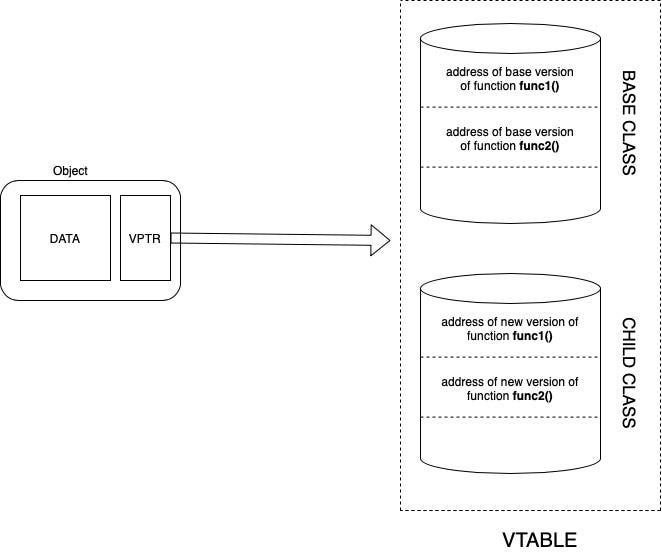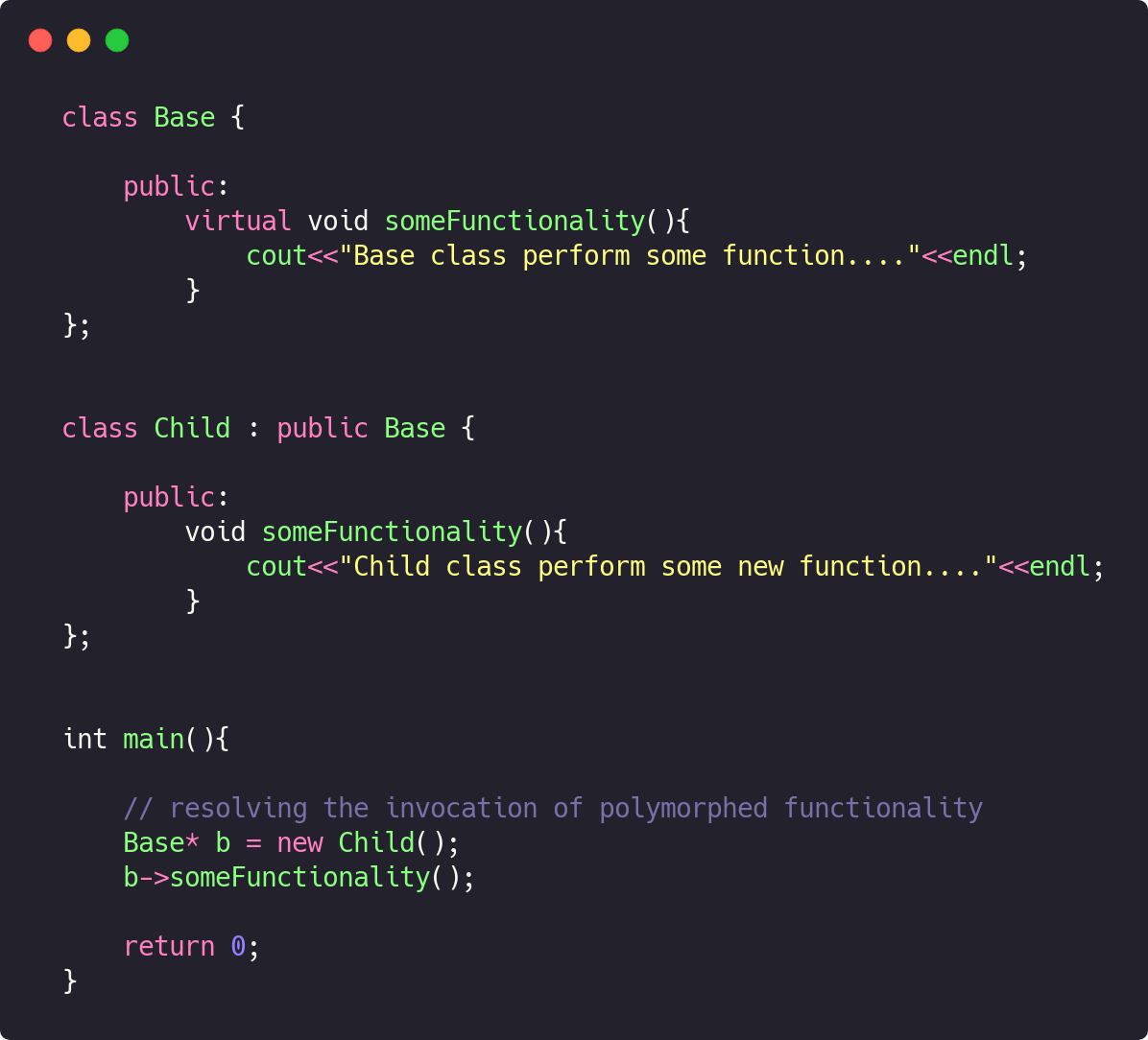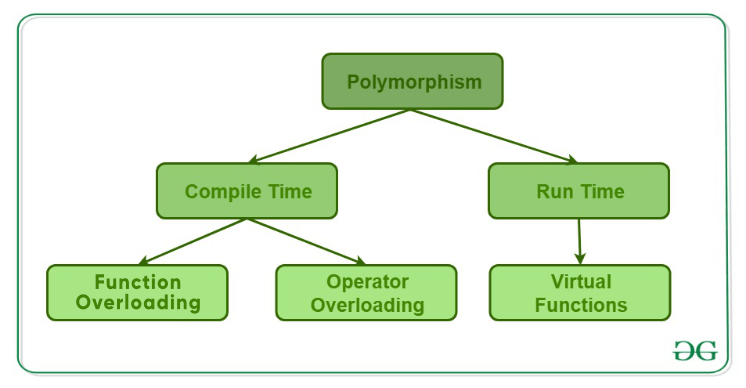A virtual function is a function in a base class that is. In dynamic polymorphism it is decided at run-time.

Everything About Dynamic Polymorphism In C By Mohit Malhotra The Startup Medium
These are the most frequently asked interview questions from OOPS concepts.

. In contract dynamic polymorphism allows you to call the exact same API which can have different behaviour in the functions for different classes. Whereas in static polymorphism we overload a function. Dynamic Polymorphism Interview Questions.
The object-oriented paradigm has three defining characteristics. This is how polymorphism is generally used. Runtime Polymorphism is also known as Dynamic Polymorphism Late Binding Method overriding etc.
Please refer to previous blog for details of Static Polymorphism. Polymorphism is often referred to as the third pillar of object-oriented programming after encapsulation and inheritance. In simple words we can define polymorphism as the ability of a message to be displayed in more than one form.
Dynamic means run-time Polymorphism means multiple shapes Synonyms for dynamic polymorphism include runtime polymorphism and dynamic method dispatch If you are a traditional relational database developer these terms might sound unfamiliar. Dynamic Polymorphism or Late Binding simply means that a particular function call as seen at source code will be resolved at runtime when the program is running. Create a virtual member function in the Base class that does what you want to do for Base classes.
Both subclassing and stdvariant are instances of dynamic polymorphism even if the latter uses static polymorphism overloading to dispatch calls. The static polymorphism is often referred to as compile-time or early binding polymorphism whereas the dynamic polymorphism is referred to as run-time or late binding polymorphism. The word polymorphism means having many forms.
Like a man at the same time is a father a husband an employee. It allows a class to specify methods that will be common to all of its derivatives while allowing subclasses to define the specific implementation of some or all of those methods. This is also known as Run-time binding Late binding.
If same functions defined in parents and child class with same signature know as function overriding. This is function overloading which will allow derived pointers to be matched with. At run time objects of a derived class may be treated as objects of a base class in places such as method.
In the previous post we explored the use of generic types in Rust and some of the common reasons for doing so. In order to get this to work via polymorphism is to do the following. This is opposite of.
In static polymorphism the response to a function is determined at the compile time. A real-life example of polymorphism a person at the same time can have different characteristics. You have different classes with a function of the same name and even the same parameters but with different implementations.
Static Polymorphism. In simple words we can define polymorphism as the ability of a message to be displayed in more than one form. Polymorphism can be static or dynamic.
So the function called depends on the type of the pointer and not the type of the object it points at no overriding polymorphism on function arguments. The following is an example showing an example of dynamic polymorphism. Statically bound function must be able to resolved.
Polymorphism in C. Dynamic method dispatch allow Java to support overriding of methods which is central for run-time polymorphism. In this article we will cover some of the interview questions with their justification for Dynamic Polymorphism or method overriding.
Show activity on this post. It is also known as dynamic binding or late binding. If function call binding is performed at compile time.
In this post Id like to take a step back and look at the full spectrum of options Rust makes available for accomplishing polymorphism and get under the covers so we fully understand the tradeoffs of the decisions we make as Rust developers. I have already written a blog post on it if you want you can check it Compile Time Polymorphism with Templates in C. A person at the same time can have different characteristics.
But how about overloading. Override that member function in the Derived class and have it do what you want for Derived classes. As you can see in the example above it is a template that allows you to call the exact same API the kindof_virtual_method_without_runtime_cost member function which can have diffrent.
If function call binding is performed at run time. In dynamic polymorphism we override a base class function using virtual or override keyword. Before reading the interview question answers go through Java Method Overriding concepts.
Although polymorphism is a potent tool it isnt easy to fully. The word polymorphism means having many forms. Like a man at the same time is a father a husband an employee.
C Static Polymorphism Dynamic Polymorphism. Dynamic Polymorphism - Why What How. Function overriding is one of the ways in which C supports Runtime Polymorphism.
Encapsulation inheritance and polymorphism. Method overriding means having two or more methods with the same name same signature but with. The static polymorphism is achieved using method overloading and operator overloading whereas the dynamic polymorphism is achieved using method overriding.
There is polymorphism available which we cant see in this example because there is a definition of setInput for each pointer type. The difference is that dynamic polymorphism dispatches calls based on the type of late bond values ie. This is also known as Compile time binding Early binding.
I hope this answer will help you. As you can see each of the child classes has a separate implementation for the function area. Polymorphism is a Greek word that means many-shaped and it has two distinct aspects.
We can achieve it by Function templates or Class Templates it is totally up to your requirement which one you should use in your code. Dynamic polymorphism is implemented by abstract classes and virtual functions. While encapsulation and inheritance can stand on their own polymorphism requires inheritance which is only possible in those systems that also support inheritance.
We can achieve compile-time polymorphism by templates in C.

Everything About Dynamic Polymorphism In C By Mohit Malhotra The Startup Medium

Object Pointer C Programming Geekboots C Programming Computer Programming Computer Programming Languages

0 Comments